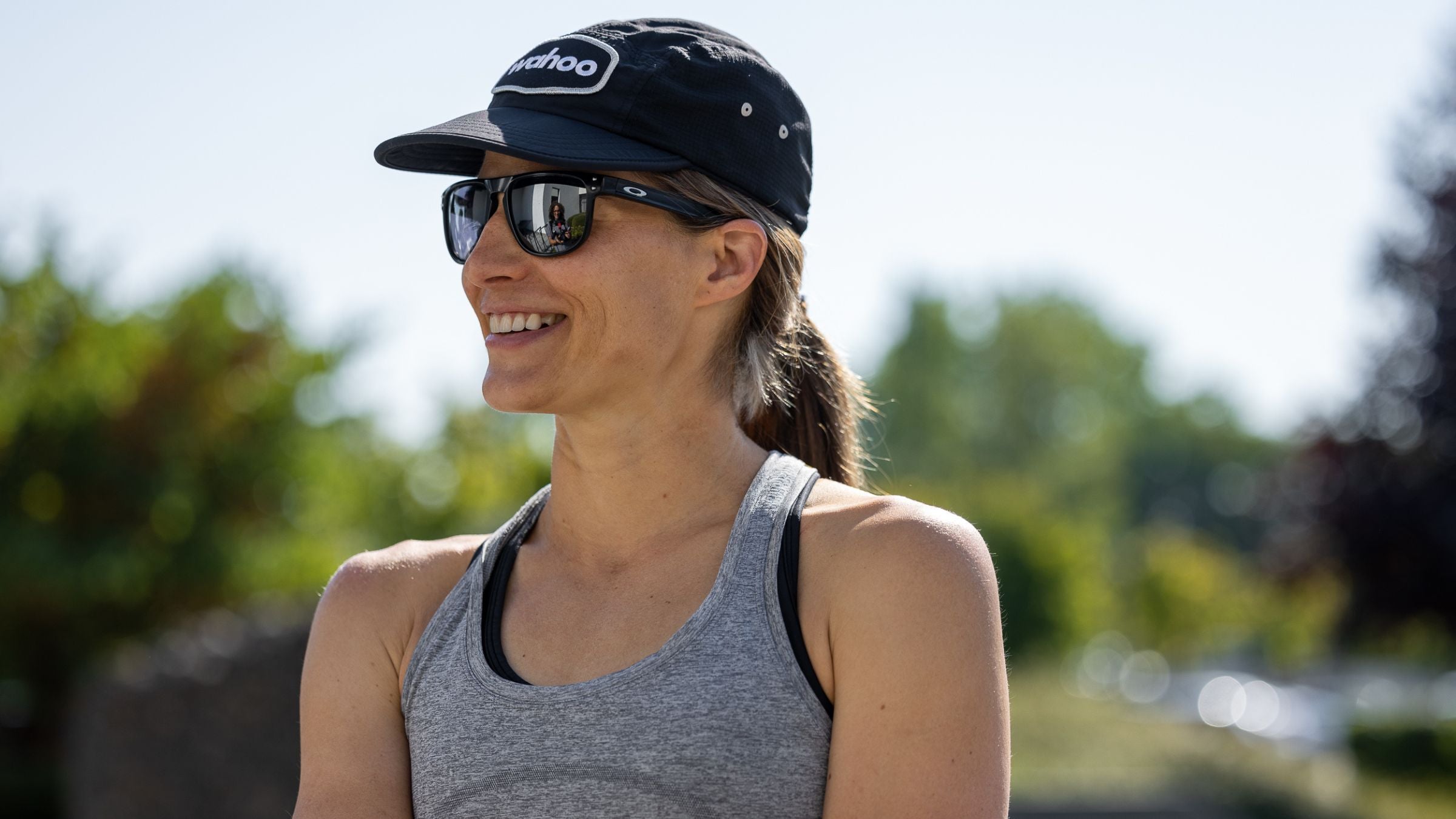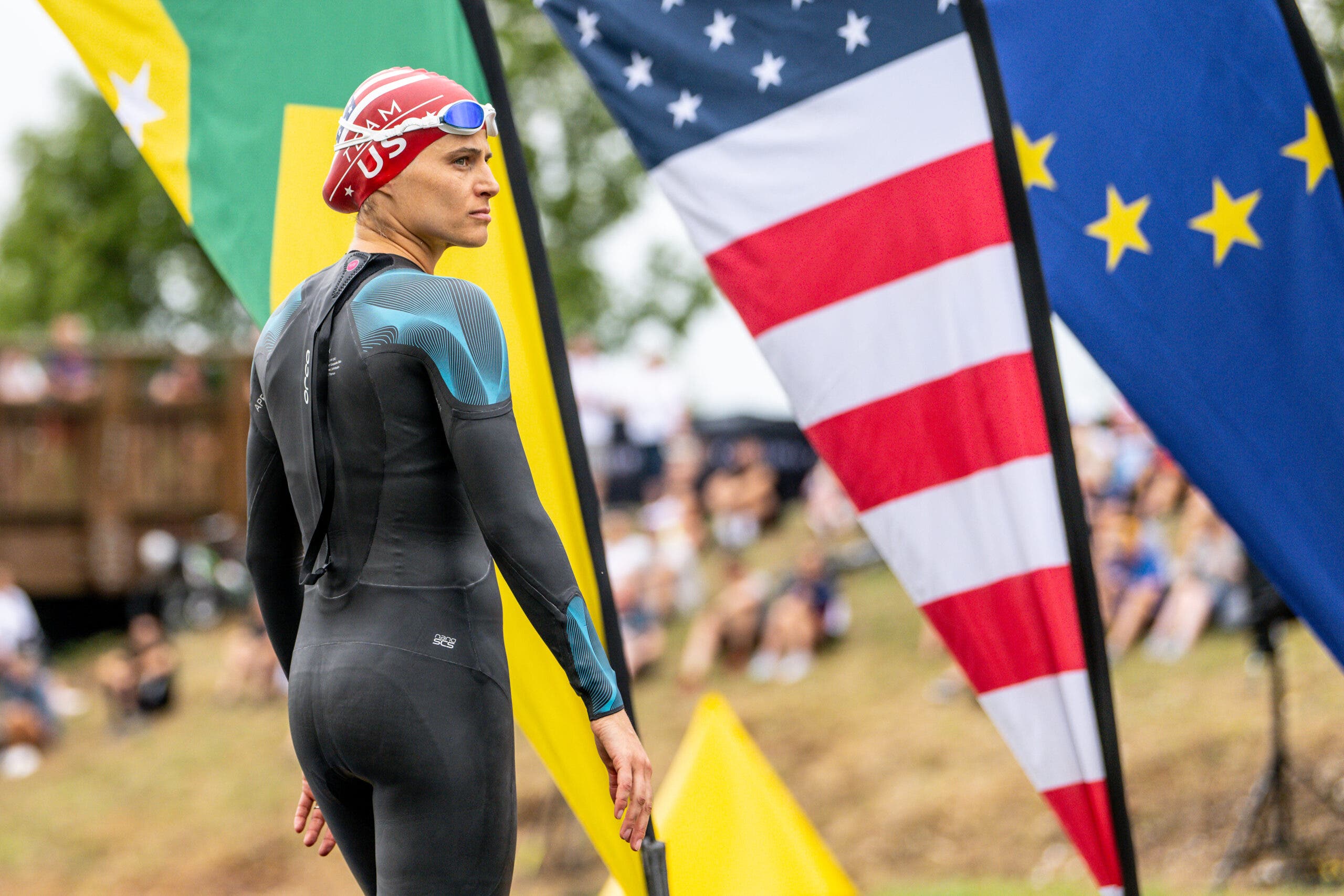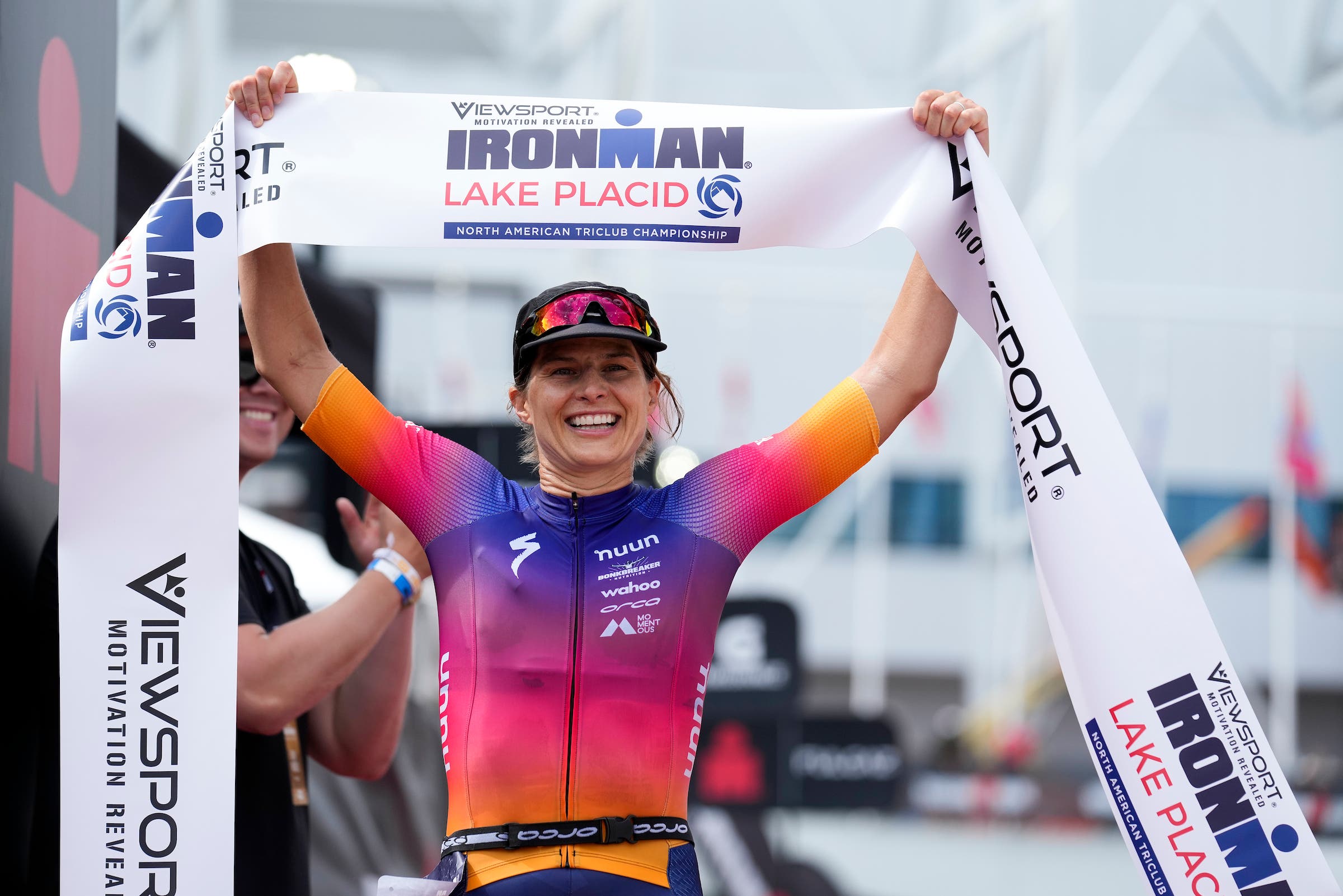Sarah True Chose Joy Over Winning. She Got Both.

(Photo: Professional Triathletes Organization)
Although there was just a mile remaining in the marathon portion of Ironman Lake Placid, and although she was winning the women’s race by more than ten minutes, there was a question about whether Sarah True would even finish. Her brightly-colored jersey was soaked in sweat and was fluttering unzipped. It was True’s first Ironman since three mysterious bouts of heat distress, and she had only a few weeks of Ironman-specific training in the past two years. While True trudged along the sticky asphalt, the DNF count of pros and age groupers alike began to pile up. Spectators on the sidelines and on social media began to chatter nervously: Would the same fate befall the two-time Olympian?
But despite the unusual heat wave in upstate New York, and despite the historic DNF rate for Ironman Lake Placid, True persevered. Breaking the tape at Ironman Lake Placid was about more than just winning the race, however. It was a statement to the world that Sarah True was back and better than ever.
The collapse seen ’round the world
True is a two-time Olympian in triathlon, representing the United States at the 2012 and 2016 Games. In 2018, she began the second act of her six-year triathlon career by moving to long-course racing full-time. That year, she finished fourth at the Ironman World Championships. But the following year wasn’t so rosy. She had to pull out of three races due to a puzzling medical condition relating to heat, most infamously during the 2019 European Championships in Frankfurt, Germany. During that race, True had a seven-minute lead, and the finish line was almost in sight. She felt “in control,” but her body began to shut down. At the final aid station of the marathon, she staggered like a drunkard in the streets at 4 in the morning.
(Video Credit: IRONMAN)
“She’s not present,” the commentator remarked. A medic pulled her off the course.
The leading hypothesis was that True’s brain became “overcooked,” like in heat illness, but her body interpreted the heat as much worse than it actually was. To get answers and solutions to her issues in the heat, True scheduled appointments with medical experts in Colorado. But just before she was to fly to Denver for medical testing, COVID-19 took over the world. All medical resources were diverted to fighting a global pandemic.
What followed is the beginning of one of the most counterintuitive third acts in modern day triathlon.
A pause and a new perspective
True’s brother, Adam, is a doctor in New Hampshire and was monitoring the early spread of COVID. Adam told True that there was a good chance she wouldn’t be racing until the end of the year.
“It allowed me to step back and realize that I didn’t want to be in this cycle of trying to get ready for races that may or may not happen,” says True. “I didn’t have much control over my present, but I realized that I could take control over my future.”
With racing on hold, True built a life that wasn’t defined by swimming, biking and running. Instead of burying herself in hours of training, she started a doctoral program in clinical psychology. She had foot surgery. She had a baby.
And after this break from triathlon, True returned with career-best results. Since June of 2022, she has won Eagleman 70.3, shattered the course record at Ironman Lake Placid by ten minutes, and was selected as a captains pick to race for Team USA at the Collins Cup in August. In October, she’ll toe the line against the world’s best at the Ironman World Championship.
Dave Scott, a six-time Ironman world champion who was part of the committee that selected True to the American Collins Cup Team, put True’s summer in perspective. “She is rocking again.”
“Maybe in some ways, the break and having these other things in my life might be an asset,” says True.

Throwing out the rulebook
There is sometimes an obsessive mentality that endurance athletes succeed through nothing other than long training days and mega miles. It’s a belief that to be successful you must live for triathlon, and triathlon alone. Distractions must be eliminated. You must run, bike and swim as much as possible while drinking little more than fizzy electrolyte tablets and lumpy protein powder. Fealty is measured by Strava or Training Peaks, where your epic feats are instantaneously ranked. What makes True’s third act so unique is that she rejected this mindset altogether.
This perspective came from True’s realization that her forced pandemic break was a glimpse into what her post-retirement life might look like.
“Professional sport is all in. It is your community and it is more than a job. And a lot of people struggle when they leave it,” said True. “I love triathlon, but there are other things that make me equally excited.”
True created an agenda that flew in the face of conventional endurance training. First, True became pregnant. Her training days during pregnancy bore little resemblance to her former self, and True learned to adapt. “Walk if you need to. There’s no shame,” she wrote after a run in the third trimester. Her son, Haakon Barrett True, was born July 2021.
Because she had spent so much time away from the daily grind of training, these sessions felt like “play” rather than “work.” She simply liked swimming, biking and running more.
“I love triathlon, but there are other things that make me equally excited.”
The comeback
Around April 2022, True’s coach, Dan Lorang, noticed that True had found her own rhythm. All signs pointed to True being ready to race again. “He let my body heal and let me find a pattern that was sustainable,” says True. Lorang aided his athlete in a return to structured training, but it didn’t look like the program she had before giving birth. “I can’t do as much training as I could when that is all I was doing. Thankfully, I have a coach who really understands energy management because we are doing fewer hours of training.”
“People think if you tack on more than you are going to get faster. We are not robots,” says Scott, who captained True during the Collins Cup. Mitochondria, the organelle where energy production occurs, plays an essential role in endurance events, explains Scott, who often sees overtrained athletes whose “mitochondria under a microscope looks like someone has taken a hammer and hit it.”
“I don’t think Sarah has the time, so she is probably not at this state where she is stale and overtrained,” says Scott.
That’s not to say that True took it easy. In her lead-up to Ironman Lake Placid, she completed a 100-mile ride with 7,000 feet of climbing. A few days later, she crushed a 15-mile long run followed by a 60 mile bike. True worked hard. But she also worked smart, building in plenty of recovery and play.
“It is important to understand your body and listen to your body’s signals,” said Lorang. “You can have a lot of tools in triathlon – power, speed, heart rate. But the most powerful tool you have is body feeling.”
With just ten weeks of smart, focused training, True lined up at Eagleman 70.3 race in June. It was a hot and muggy day, but True won – a promising sign that her heat issues in the past may have resolved themselves during the forced break. But the real test came during the last miles of the marathon leg of Ironman Lake Placid in July. True hadn’t done many long runs in her short build-up, and a precise understanding of her heat distress was still unclear. But under the beating sun on race day, with her triathlon top pulled open to allow for more cooling, True’s mechanical stride chugged along.
“I wasn’t thinking about the past,” says True of her mindset during Ironman Lake Placid. “I was thinking about what can I do in this moment to stay in control of my race.”
As the miles ticked on, True began to walk the aid stations, something that she had been too stubborn to do before pregnancy. Her lead remained. With a little less than a mile to go, around the same distance that she began to really falter in the 2019 Frankfurt heat, True zipped up her jersey. When she crossed the finish line in first place, her time was 10 minutes faster than the previous course record. True had prioritized joy before winning, yet had achieved both.

By winning Ironman Lake Placid, True qualified for the World Championships in Hawaii. She knows the type of intense training it takes to win or have a podium spot, and she admits it is unlikely she’ll be able to beat out the likes of past champions Daniela Ryf or Anne Haug. Instead, she wants to have a “great experience and race well.” For True, that would mean a top-10 finish.
“It would be a huge win to say I just got 7th place at Ironman World Championships and I have a baby, I am in a doctoral program, I have a lot going on — especially after my history with the heat. ” says True. “There is a different definition of victory for each one of us.”